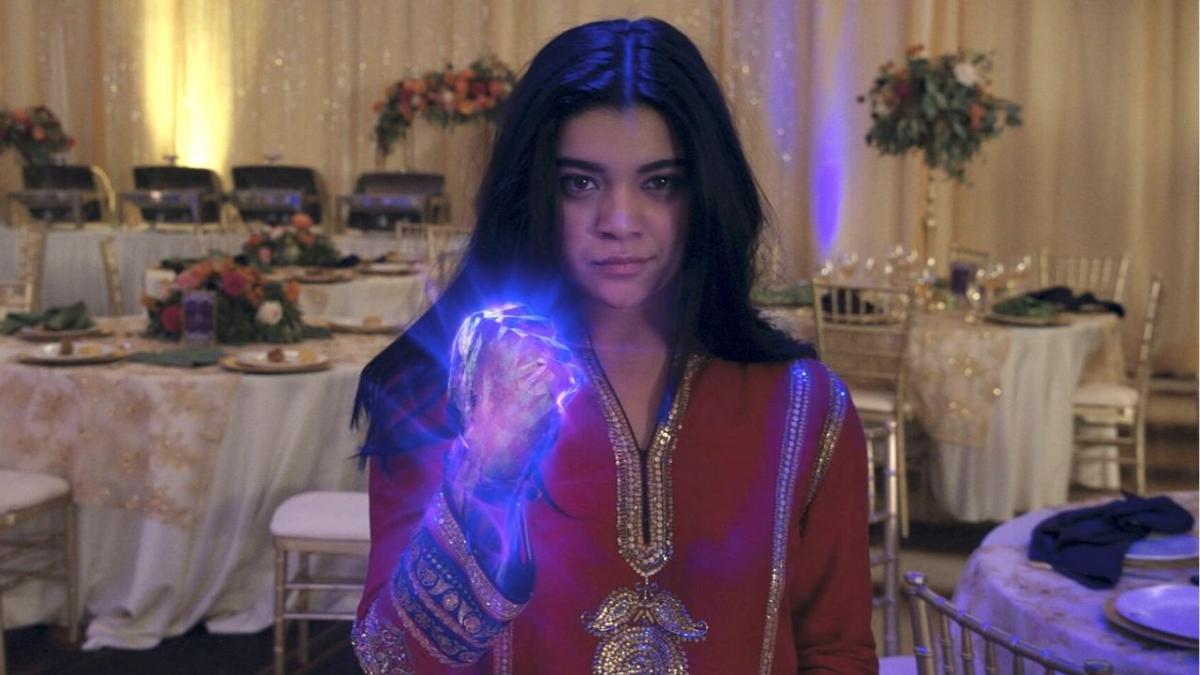
It took about 60 seconds for Disney+’s Ms Marvel to completely win me over.
I’ll be honest, I don’t know a whole lot about comic books and superheroes. Much like our leading lady Kamala Khan (Iman Vellani), I’ve held the conception that brown girls never really save the world. Not because they can’t — trust me, I speak from experience when I say there is no one more resourceful than a Pakistani Muslim teenager with strict parents. But back in the early 2010s, the (movie) superhero world wasn’t very racially diverse.
Ms Marvel, however, is single-handedly changing that.
Mild spoilers ahead, btw!
In case you aren’t across it, Ms Marvel is about a Pakistani-American teenager named Kamala Khan who lives in New Jersey. She’s 16 years old, a huge freak for Marvel and loves everything superheroes — especially Captain Marvel (Brie Larson), who she reckons is the best superhero ever. She’s also a daydreamer who’s trying to figure out what her place in the world (read: high school) is — which is kinda hard when you’re also battling strict parents and the pressure of success that first-generation children of immigrants are familiar with.
After trying on a piece of her Nani’s jewellery, Kamala realises she has superpowers, making things a lot more complicated — and that’s where her story really begins.
But let’s talk about how the actual first episode of Ms Marvel begins. In the first 5 seconds of seeing Kamala’s life, we hear her say “ammi” (mum in Urdu), her brother Amir is openly making dua (i.e praying) before eating — like, real prayers from real life that my family and I recite!! — and “Allah” (God in Arabic) is mentioned casually and unapologetically. All before she rushes out the door to school. The way my jaw dropped.
Throughout the episode, there are intimate nods to Pakistani Muslim diaspora that left me giddy. Halal food signs at street vendors, South Asian shops selling barfi, churiyah and shalwar kameez, Quranic decor around the Khan house, words like “beta”, phrases like “Bismillah” and “Astaghfirullah”. A beautiful cacophony of visuals and sounds that are a gorgeous representation of who we are.
There are also less sweet — though equally impactful and important — nods to the more complicated parts of being a brown girl. For one, someone at school calls Kamala “Camellia”. As someone who was once called “Saliva” by a substitute teacher when I was in high school, I definitely felt seen. Are you even ethnic if your name isn’t completely butchered by a random at school??
But let’s get away from the negatives for a second. Lord knows too much “diversity” is written around trauma and shame. Something I love about Ms Marvel is that while racism has a presence (it’d be dishonest if it didn’t), the show centres around the beauty, joy and unique potential that comes with being a South Asian and Muslim teenager, even when that stuff is complicated. I was a bawling mess when I realised I’d never really seen my culture and religion depicted this way. Positivity?? In my representation?? It’s more likely than you think!
Whether it was the wholesome scene of Kamala’s brother bringing her a cup of tea — a peace offering in any Pakistani household — or the complicated yet sweet actions of Kamala’s overbearing parents, the tenderness written into Kamala’s story and character is really a testament to the team behind it, who obviously made the effort to ensure Muslim Pakistanis were at the forefront of the creative process.
But here’s the aspect of diversity in Ms Marvel that really gets me: Kamala’s high school coming-of-age story doesn’t require her to abandon her identity to grow. Her culture and religion are not to be overcome to be who she truly is, like we see in so many other attempts at writing diaspora stories. Instead, her culture is depicted as inherent to her, a part of her, inalienable and powerful, and one she has to learn to understand, mould, and accept rather than defeat.
Kamala’s lineage as a Muslim Pakistani is positioned as empowering for her rather than a limitation.
15 year old Iman Vellani made a Ms. Marvel suit for Halloween and all her friends thought she was The Flash😭. Years later now she IS Ms. Marvel in the MCU. Like woww pic.twitter.com/PbRPdbnj7E
— carlos✧ (@CINEPAPI) June 1, 2022
When I was in high school, I was so insecure about who I was that I was repulsed by my own culture’s clothes, food, even language. I was so desperate to feel normal that I was willing to shed my identity and assimilate into whiteness, because that is what it took to be taken seriously.
In Ms Marvel, we see Kamala proudly wear her Nani’s bangle, and unapologetically be a brown girl at school. I cannot express how much a show like this would have seriously changed my life.
Kamala is compelling as a character because she is sweet, funny, super smart and so wonderfully likeable. But also, to me, she is what I could have been if I was given the chance, if I didn’t grow up in a time where I was shamed of who I was. And I am so excited for young brown girls everywhere to realise their own potential through her. Because they too, are powerful — and they don’t need magic to feel it.
Ms Marvel is now streaming exclusively on Disney+.



